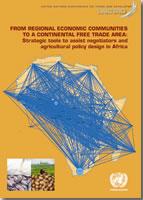
The establishment of the Continental Free Trade Area (CFTA) presents major opportunities and challenges to boost intra-African trade.
Expanded markets for African goods and services, unobstructed factor movements (i.e. labor, capital, and other factors) and the reallocation of resources should promote economic diversification, structural transformation, technological development and the enhancement of local human capital.
The CFTA, if fully implemented, could increase intra-African trade significantly and promote structural transformation by providing a lever to industrial development in African economies.
In this context, this report seeks to enhance knowledge among policymakers, experts and private sector stakeholders on essential policies and measures for establishing the CFTA and boost regional supply chains in not only agricultural commodities but also processed food products.
This has been done through network analysis, which allows visualizing which country has competitive advantage over others in each trade agreement or regional context, as well as highlight overlapping regional agreements and identify trade hubs within Africa.
The report then carries out a specific analysis of agricultural products identified in the Abuja declaration and in other literature sources as being of interest.
The ultimate purpose of this work is to inform African policy-makers with strategic tools to assist trade negotiations and agricultural policy design.
Its focus is on the eight Regional Economic Communities that exist in Africa, as they do not only constitute key building blocks for economic integration, but are also important actors working in collaboration with the AU in ensuring peace and stability in their regions.


